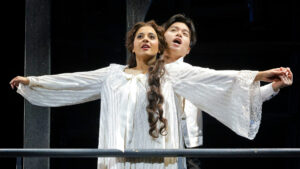
The first two times the Ian Judge production of Charles Gounod’s Romeo and Juliet were performed by LA Opera, Kitty McNamee was the choreographer. It was her first time choreographing an opera. This year, the third time around for this production, McNamee is sitting in the director’s chair and serving as choreographer.
McNamee had her own dance company in Los Angeles: Hysterica which launched in the late 1990s. She’s choreographed many other opera (for LA Opera and other companies worldwide).
McNamee has also worked with the Los Angeles Philharmonic, Oregon Shakespeare Festival, Hollywood Bowl, Pasadena Playhouse and more.
Hopping into the director’s chair was both exciting and daunting for McNamee. Though she knew the production well, there were things she wanted to do to freshen it up. A serious re-working of the production wasn’t an option. She found the areas where she felt she could bring something new to this tragic story of star-crossed lovers.
McNamee discusses her journey on this production, the power of love stories where couples don’t end up together and whether she can see herself in her work in Romeo and Juliet. What follows are excerpts from our conversation that have been edited for length and clarity. To see the full interview with McNamee, please go to our YouTube channel.
Q: Composer Charles Gounod is quoted as having said, “My opinion changes rapidly. One minute I can think it is very good and the next time I look at it, I see all the flaws and weaknesses therein.” How much does does that perspective reflect your experience as a choreographer and perhaps as an opera director now?
I think that resonates so profoundly with me. I mean, I could have written that myself particularly when there is an audience watching with you. You just feel so exposed because any little problem or shift in the flow, you take such responsibility for. It’s interesting because I can look at the archivals to give notes and I’m removed and it’s not people with me. I’m so much more comfortable. And you think, wow, this is really gorgeous production. I can see the strength and the beauty of it. But watching with an audience is really terrifying.
Is it more terrifying now that you’ve taken on the title of director?
Yes, because this is the first opera I’ve ever directed. Actually, Romeo and Juliet was the first opera that I’d ever choreographed. So the first time I was quite nervous. The second time, less so. But this feels right and feels like a great fit for me. But my palms were sweaty.
There are certain restrictions on how much you can change an existing production. This one was originally directed by Ian Judge. You told San Francisco Classical Voice that you don’t have that much freedom except to “freshen it up.” How would you define freshening it up as this production looks compared to the two previous productions?
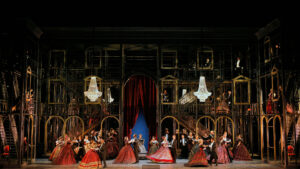
That’s a great question. The set is as it is. I can’t change the set. I could adjust slightly, maybe the timing of transitions, but the set functions in a very specific way. I inherited that. Also, the score calls for when people enter the story, calls for who comes in and what happens. So that’s all fixed. But the nuancing of performances and making some choices. For instance, having Mercutio stay on stage after he dies. The Romeo and Mercutio, Duke [Kim] and Justin [Austin] are also friends, have worked together and they have a very dynamic chemistry. So I decided to keep him onstage.
I think my biggest impact is in the performance of of the singers and how I can perhaps add my my sense of drama, my physical interpretation of storytelling and utilize that to give their performances a little bit more freedom.
If you had the freedom to not do a 100% overhaul of this production, but say if you had the freedom to change 50% of it or more freedom than what you had, are there things that stand out to you as things that you would like to see different?
I would like to somehow simplify the transitions. There’s quite a few. Towards the end it’s very challenging. So that would be my number one thing. I think the set is glorious. Maybe in the past we had more bodies on stage to help deal with things or the budget is not quite maybe what it was before. And I have to say a shout out to L.A. Opera, by the way, for continuing to make work and continuing to bring this extremely high level of talent to L.A. audiences.
This is your third collaboration, as we discussed, with L.A. Opera on Gounod’s Romeo and Juliet. How have you seen your work grow in the 19 years since you first were involved with this production?
I think the number one thing is that I trust my instincts more. I think that I’ve learned to trust my instincts. Within the noise of directing there are so many people asking you so many questions, which is very different from just choreographing. My assistant director, Erik Friedman, was incredibly helpful. He handled a lot of the task-oriented, schedule-oriented [work]. But also in the room he said, “You know, it’s your voice, it’s your vision that counts, Kitty. In this situation you’re the director.“
You’ve stated previously that you wanted this production to be experienced through Juliet’s eyes so there’s more agency of her story and her fate. How do you, as a director, make that something an audience is going to inherently feel or just think about?
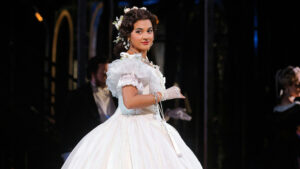
Our Juliet is very powerful as a person. Amina is very powerful. She is insightful and not afraid to voice her opinion. When I encountered her, and she came in very late, I had to remind myself I wanted her opinion. I wanted her point of view. Duke is elegant, princely, wonderful and gentle. Like the epitome of a romantic lead. And I knew that trusting my gut was going to bring this fire, this sort of pressure to the role. So I just tried to listen to her and actually truly let her have agency, which I think comes through in the production.
The way it came through to me is and I am assuming this is part of the construction of the opera, is how quickly Juliet says yes to marrying Romeo. I just feel like only somebody who has that agency can say yes that quickly.
And is willing to risk everything for it. Particularly, for me, in the poison potion aria when she makes that decision. She’s willing to risk everything to not only fulfill her love for Romeo, but also not be given away. Not have her body given away. Not have her soul given away by her parents to someone. She had already committed to Romeo at that point.
Is it important for the audience to understand this?
Maybe I just assumed that they would. Sometimes I just make those assumptions. I just assume people would make that leap. She’s a heroine. In my mind it should have gone smoothly. This should’ve been a romantic comedy, but the parents had to get in there and society had to get in there. One thing that I really appreciated about Amina was that she’s able to pull off the lighter youthful tone in the beginning of the opera and she has the resonance and the depth of character to make the later moments plausible.
Why do you think we, as an audience, respond so strongly to stories where the couple does not end up together? Why is great love doomed to separation or death?
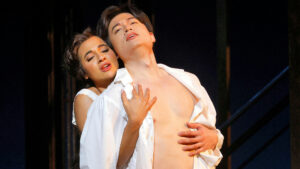
It’s weird when you put it that way. It makes me want to cry. It does. And I’m not a crier. But there’s such hope for me in young people believing in love and believing in a peaceful existence. It’s so incredibly hopeful. I think that all of us wish that this never-ending hatred, this never-ending war… And people don’t know why it started, but it continues. How the young people today would love for peace and for love to rule. It’s manageable to see this tragedy in an opera. It’s done. We can walk away. It’s cathartic, but it begins with the hope and they start with the purity of love. So maybe it’s a way for humanity to sort of manage reality.
Or get a sense of how fragile that purity of love really is.
I thought about my first love. Other people’s first loves. How you just had every hope in the world that it would be this beautiful thing forever. Then reality smacks you in the face. The differences creep in and reality creeps in the day to day. Maybe this is just a way to hold on to that hope.
With Romeo and Juliet now open, does that fuel a desire to direct more operas? Was this so gratifying that you can’t wait for the next one?
Yes. Even though it was terrifying, I felt very much that I was in the right place. It felt so comfortable. I love music. I’ve always been obsessed with music. I’ve always been obsessed with storytelling. Usually it’s telling the story through movement and music with no text. Even though I’ve worked with opera singers as choreographer, it was different because I was working with them directly with their interpretation of these roles over time. You know, I loved it.
You’ve mentioned in previous interviews wanting to work with composers Missy Mazzoli and Ellen Reid, two women who I think are amazing composers and they’re also disruptors of what the form is. If you look at a couple of male directors, Yuval Sharon, James Darrah, they’re also disruptors. How important is it for you to either be a disruptor or to work with disruptors as you continue your work in opera?
It’s fascinating because my company was called Hysterica and we were in L.A. for ten solid years. But we were very much disruptors in the dance world. And all of the people that came out of my company are very much disruptors like Ryan Heffington and Nina McNeely, both of whom just won Emmys for work in a medium that ten, 15 years ago, would not have hired any of us. It’s kind of ironic that I’m in this very classical world given where I started. I was like a punk rock dance company. I feel like all of these startups are bringing me to the place where maybe I can do what I did in the dance world in the opera world.
How important is it now for you to take a risk yourself?
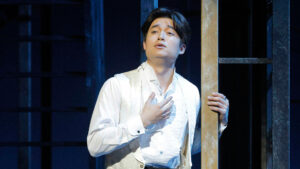
It’s very important because, I’m not going to lie, when I got the job, I was like, don’t fail. That’s all I kept thinking during the entire rehearsal [process]. Don’t fail. You hate to fail. I think my entire life has been open to risk. I have failed in the past and you suffer. But the joy of taking the risk is larger for me than if I didn’t take the risk and I turn the opportunity down. That is more of a failure for me.
Martha Graham is quoted as saying, “Nothing is more revealing than movement.” What does your movement on stage, whether in Romeo and Juliet or anywhere else that people have seen your work, reveal about you?
First of all, I love Martha Graham. Some of my dancers from Hysterica days came to opening night. They said we can see your touch in this super-heightened format. They’re still human and you can feel the humanity in the way they’re moving. I think that’s really what drives me – human reaction.
And do you see yourself on the stage? Not just your work, but do you see aspects of yourself on that stage?
If I look back at my contemporary dance work, I’m like, my God. Looking back at it now, my whole psychology is on parade, right? I mean, I’m a romantic. I think that’s on display. My personal dream for that pure love is on display and my investment in that.
To watch the full interview with Kitty McNamee, please go here.
LA Opera’s production of Romeo and Juliet continues at the Dorothy Chandler Pavilion in Los Angeles through November 23rd. For tickets and more information, please go here.
Main Photo: Kitty McNamee (Photo by Nate Lusk/Courtesy KittyMcNamee.com)


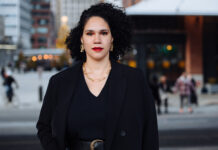



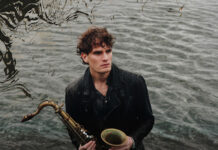
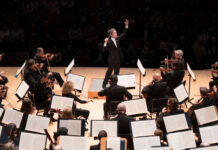



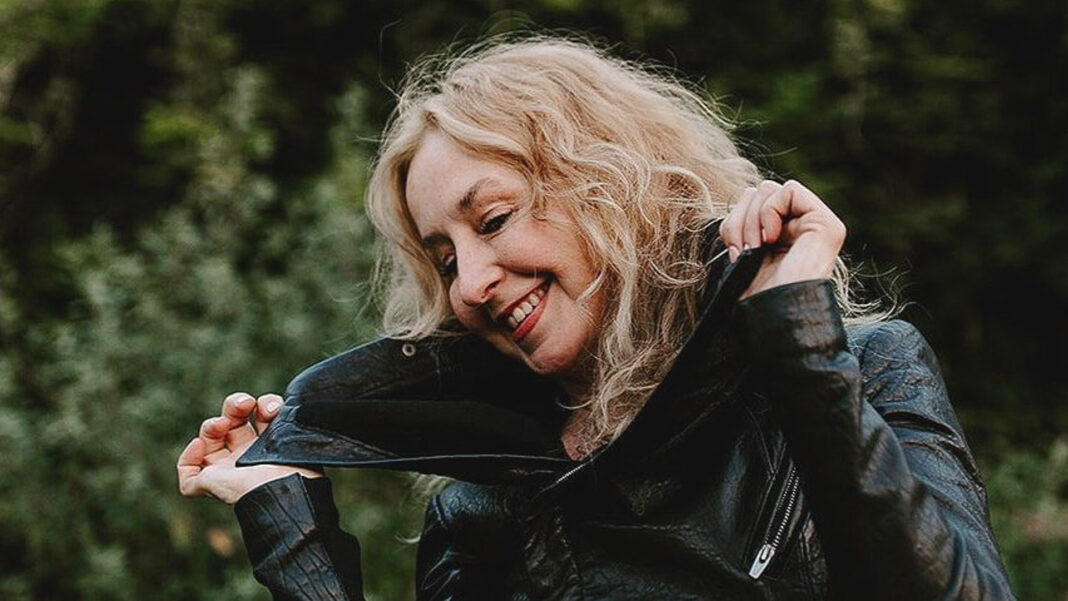
What a wonderful interview.
Thank you for reading this story!
So exciting!